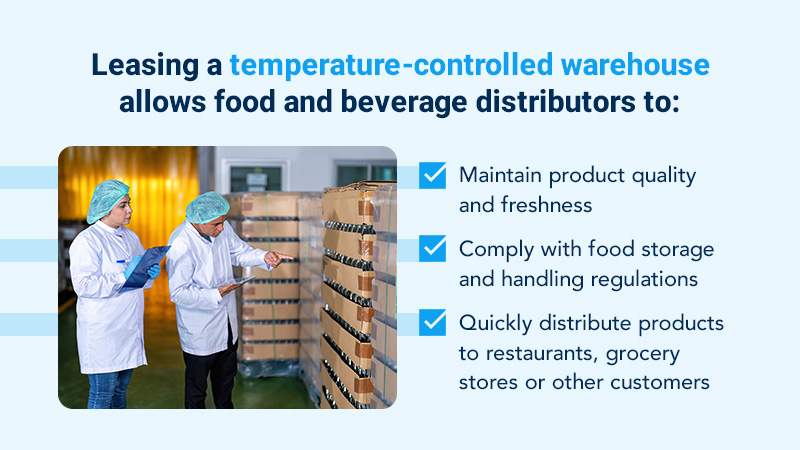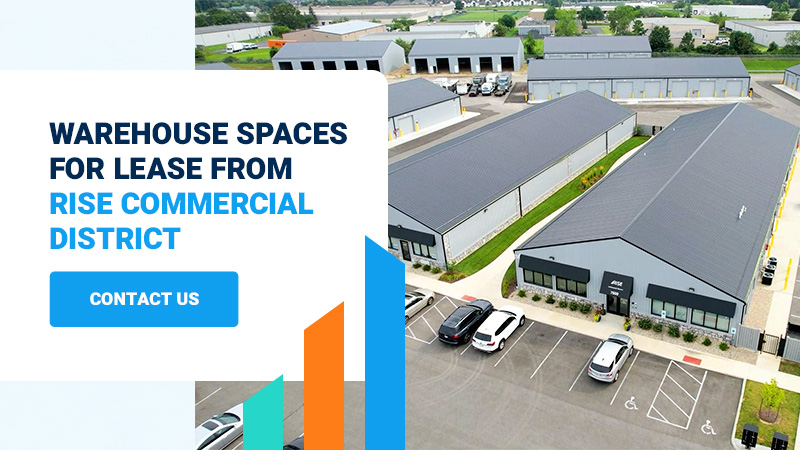Cold Storage is coming soon to RISE! Contact us today.
Companies across industries constantly seek ways to optimize their operations and reduce costs. One solution that has gained significant traction is leasing warehouse space. Leased warehouses allow businesses to enjoy the benefits of a dedicated storage and distribution facility without the hefty investment and long-term commitment of purchasing one. Leasing warehouse space provides the flexibility, scalability and cost savings that many companies need to thrive.
This article explores the types of businesses that use leased warehouses and how they benefit from the space.
As supply chain dynamics and business models evolve, leasing warehouse space is becoming popular among enterprises across various industries. Here are some types of businesses that could use leased warehouse space to optimize their operations.
Online retailers are among the top companies that use leased warehouse space. These businesses require sophisticated fulfillment solutions to remain competitive in the digital marketplace. Leasing warehouses allows e-commerce companies to strategically locate inventory closer to customers for faster shipping and flexibly expand storage capacity during peak seasons.
Leased facilities also provide e-commerce retailers with temperature-controlled zones for sensitive products and cross-docking facilities for rapid throughput. By leasing a warehouse, e-commerce businesses avoid the capital expenditure of purchasing their own warehouses and can focus on growth without being constrained by fixed warehousing assets.
Third-party logistics providers are another prime example of businesses that could use leased warehouses. Leasing warehouses in strategic locations enables 3PLs to efficiently serve their customers’ distribution needs.
As supply chain intermediaries, they require ample space to store and manage inventory for multiple clients and provide value-added services like kitting, packaging or order fulfillment. They also cross-dock shipments to optimize transportation.
Many manufacturing companies lease warehouse space to store raw materials, work-in-progress inventory and finished goods. They also use warehouses to create quality control and testing zones, returns and reworking processing areas, and buffer inventory storage areas for just-in-time manufacturing.
Manufacturers can focus on their core competencies without the burden of managing a warehouse by leasing warehouse space. Leased facilities offer manufacturers the ability to:
International trade businesses require specialized facilities near transportation hubs. They frequently use leased warehouse space to store goods during customs clearance, consolidate shipments and stage products for distribution.
Leased warehouses near ports or border crossings can streamline logistics and reduce transportation costs for these businesses. These strategically located facilities enable companies to quickly and efficiently manage the flow of goods, ensuring timely delivery to customers and compliance with international trade regulations.
Food and beverage distributors, including grocery suppliers, restaurant wholesalers and specialty food importers, have some of the most specific requirements among the types of businesses that use leased warehouses. Their facilities must maintain strict environmental controls and meet food safety standards. For example, facilities must have:
Leasing a temperature-controlled warehouse allows food and beverage distributors to maintain product quality and freshness, comply with food storage and handling regulations, and quickly distribute products to restaurants, grocery stores or other customers.
Construction and home improvement suppliers — including building material manufacturers, hardware stores and equipment rental companies — often lease warehouse space to store and manage inventory. These businesses require ample storage for many products, such as lumber, tools, fixtures and appliances.

Leased warehouses allow businesses in construction and home improvement to maintain adequate inventory levels and quickly meet the demands of contractors and homeowners. Additionally, leasing warehouse space enables suppliers to avoid the expenses and responsibilities of owning and managing a warehouse, allowing them to focus on sales and customer service.
Pharmaceutical and medical supply companies have unique storage and distribution requirements due to the sensitive nature of their products. These facilities must maintain:
Leasing warehouse space allows pharmaceutical and medical supply companies to focus on research, development and sales while ensuring their products are stored in compliance with regulatory requirements. It also allows companies to maintain product integrity and efficacy and efficiently distribute products to health care providers, pharmacies and patients.
Traditional retail operations use warehouse spaces for inventory management and distribution. These businesses require efficient systems for store replenishment, seasonal merchandise management and returns processing.
Cross-docking facilities support direct-to-store delivery programs, reducing handling costs and improving inventory turnover. Visual merchandising areas enable the preparation of store displays and promotional materials, while dedicated zones support returns processing and inventory reconditioning.
Companies with significant seasonal fluctuations in inventory requirements find particular value in leased warehouse space. Holiday decorations suppliers, sporting retailers and agricultural product distributors benefit from the ability to scale storage space according to seasonal demands. These businesses require flexible lease terms and the ability to expand or contract their storage footprint quickly.
The versatility of leased warehouse spaces allows seasonal businesses to scale operations efficiently, manage seasonal fluctuations and maintain competitive advantages in their respective markets.
Leasing warehouse spaces offers numerous benefits for businesses across various industries, from e-commerce retailers and 3PLs to manufacturers and seasonal companies. By leveraging leased facilities, these businesses can improve operational efficiency, reduce costs and focus on growth.
RISE Commercial District provides an ideal solution for companies seeking flexible, affordable and well-equipped warehouse space. With turnkey facilities, complimentary amenities and comprehensive services, we offer a premier leasing experience.
Contact us today to discover how our leased warehouse solutions can elevate your business.

Leasing warehouse space offers several benefits, including flexibility, scalability and cost savings. Businesses can avoid the capital expenditure of purchasing a warehouse or larger office space for storage, adapt to changing storage needs, and locate inventory closer to customers or suppliers.
Warehouse leases can vary in duration, pricing and included services. For companies that use leased warehouse space, terms range from monthly agreements to multiyear contracts, with flexible options accommodating business growth and seasonal needs. Common lease types include full-service, net and modified gross leases.
When selecting a leased warehouse, consider factors such as location, size, amenities and lease terms. Evaluate your business’s specific needs, such as proximity to transportation routes, required storage conditions and value-added services.
To optimize leased warehouse space, implement efficient inventory management systems, utilize vertical storage solutions and streamline product flow. Consider working with a logistics consultant or 3PL provider to maximize the efficiency of your leased warehouse.